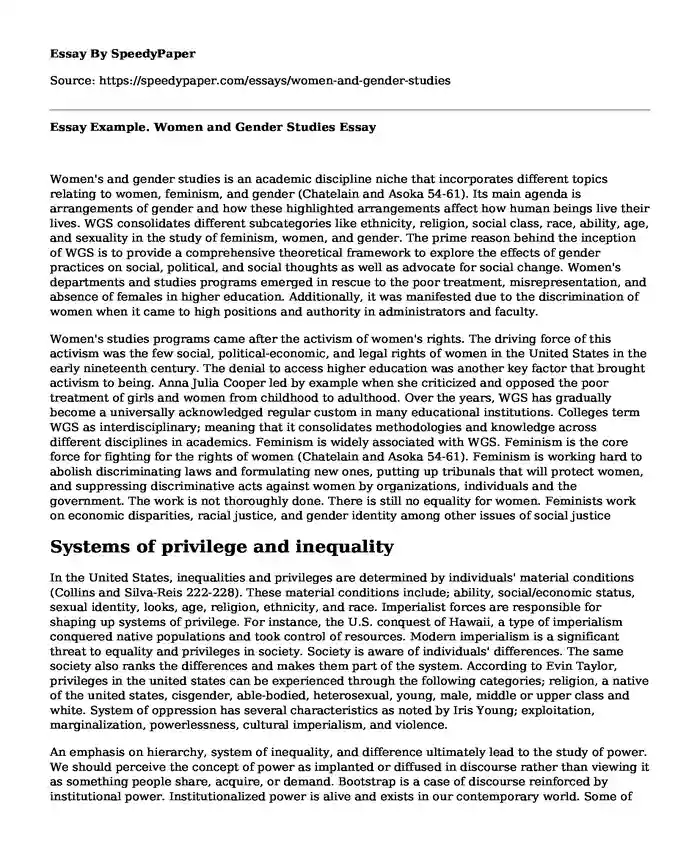
| Type of paper: | Essay |
| Categories: | Female Women Gender Discrimination Social issue |
| Pages: | 3 |
| Wordcount: | 633 words |
Women's and gender studies is an academic discipline niche that incorporates different topics relating to women, feminism, and gender (Chatelain and Asoka 54-61). Its main agenda is arrangements of gender and how these highlighted arrangements affect how human beings live their lives. WGS consolidates different subcategories like ethnicity, religion, social class, race, ability, age, and sexuality in the study of feminism, women, and gender. The prime reason behind the inception of WGS is to provide a comprehensive theoretical framework to explore the effects of gender practices on social, political, and social thoughts as well as advocate for social change. Women's departments and studies programs emerged in rescue to the poor treatment, misrepresentation, and absence of females in higher education. Additionally, it was manifested due to the discrimination of women when it came to high positions and authority in administrators and faculty.
Women's studies programs came after the activism of women's rights. The driving force of this activism was the few social, political-economic, and legal rights of women in the United States in the early nineteenth century. The denial to access higher education was another key factor that brought activism to being. Anna Julia Cooper led by example when she criticized and opposed the poor treatment of girls and women from childhood to adulthood. Over the years, WGS has gradually become a universally acknowledged regular custom in many educational institutions. Colleges term WGS as interdisciplinary; meaning that it consolidates methodologies and knowledge across different disciplines in academics. Feminism is widely associated with WGS. Feminism is the core force for fighting for the rights of women (Chatelain and Asoka 54-61). Feminism is working hard to abolish discriminating laws and formulating new ones, putting up tribunals that will protect women, and suppressing discriminative acts against women by organizations, individuals and the government. The work is not thoroughly done. There is still no equality for women. Feminists work on economic disparities, racial justice, and gender identity among other issues of social justice
Systems of privilege and inequality
In the United States, inequalities and privileges are determined by individuals' material conditions (Collins and Silva-Reis 222-228). These material conditions include; ability, social/economic status, sexual identity, looks, age, religion, ethnicity, and race. Imperialist forces are responsible for shaping up systems of privilege. For instance, the U.S. conquest of Hawaii, a type of imperialism conquered native populations and took control of resources. Modern imperialism is a significant threat to equality and privileges in society. Society is aware of individuals' differences. The same society also ranks the differences and makes them part of the system. According to Evin Taylor, privileges in the united states can be experienced through the following categories; religion, a native of the united states, cisgender, able-bodied, heterosexual, young, male, middle or upper class and white. System of oppression has several characteristics as noted by Iris Young; exploitation, marginalization, powerlessness, cultural imperialism, and violence.
An emphasis on hierarchy, system of inequality, and difference ultimately lead to the study of power. We should perceive the concept of power as implanted or diffused in discourse rather than viewing it as something people share, acquire, or demand. Bootstrap is a case of discourse reinforced by institutional power. Institutionalized power is alive and exists in our contemporary world. Some of these institutions include; marriage, family, government, science, education, military, mass media, criminal justice system, among others (Collins and Silva-Reis 222-228). These institutions are meant to satisfy the needs of the society in general, and they contrary treat specific individuals better than others. These institutions are the pillar of bringing system inequality and privilege to being.
Works Cited
Chatelain, Marcia, and Kaavya Asoka. "Women And Black Lives Matter." Dissent 62.3 (2015): 54-61. Web.
Collins, Patricia Hill, and Dennys Silva-Reis. "Black Feminist Thought And Translation Studies: Interview With Patricia Hill Collins." Revista Artemis 27.1 (2019): 222-228. Web.
Cite this page
Essay Example. Women and Gender Studies. (2023, Feb 07). Retrieved from https://speedypaper.com/essays/women-and-gender-studies
Request Removal
If you are the original author of this essay and no longer wish to have it published on the SpeedyPaper website, please click below to request its removal:
- Free Case Study Example on Child Development Theories
- Temple of Caesar, Art Essay Sample for Students
- Education Essay Example: Continuing Academic Success
- Essay Sample: August Wilson Life and Work and Frida Kahlo Life and Paintings
- Free Essay: Efficacy And Safety Of Low-Molecular-Weight Heparin After Knee Arthroscopy
- Essay Sample on The Feminine Mystic Analysis
- Essay on Exploring Attitudes Towards Aging: A Comparative Gender Analysis in the United States
Popular categories




